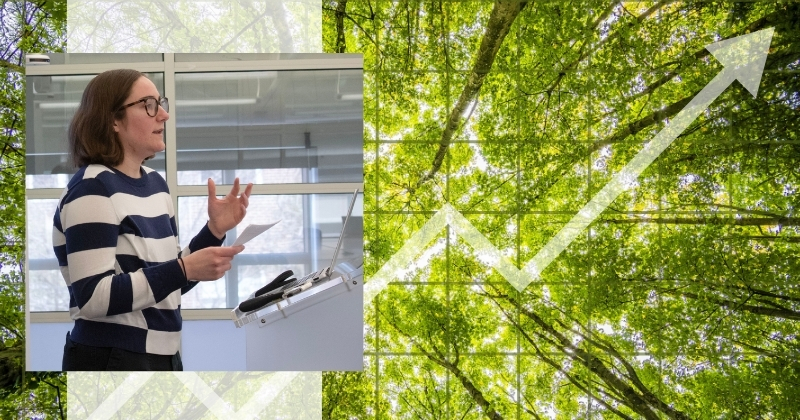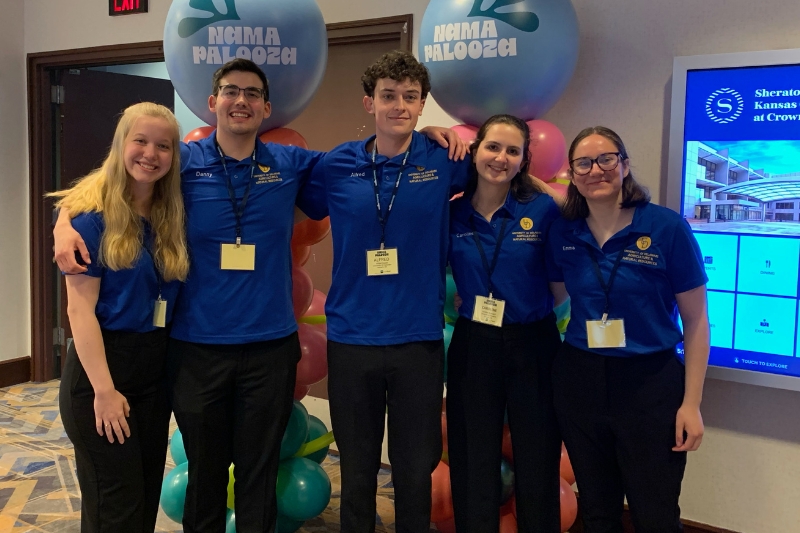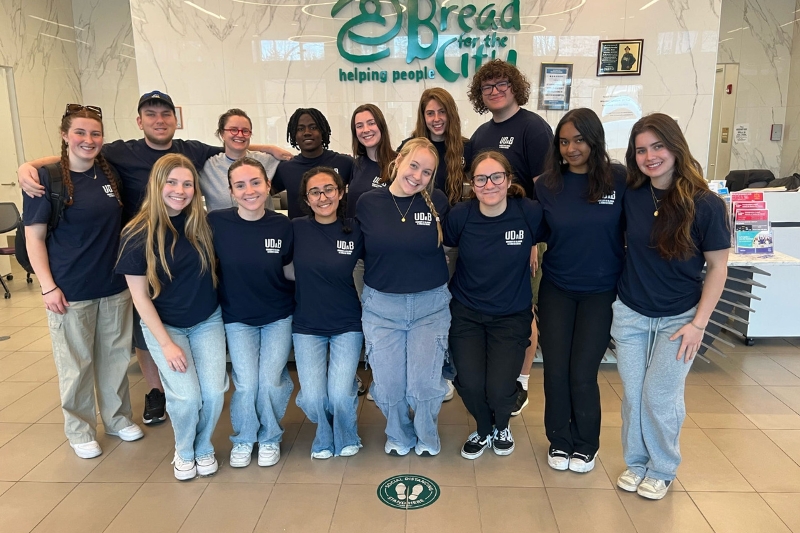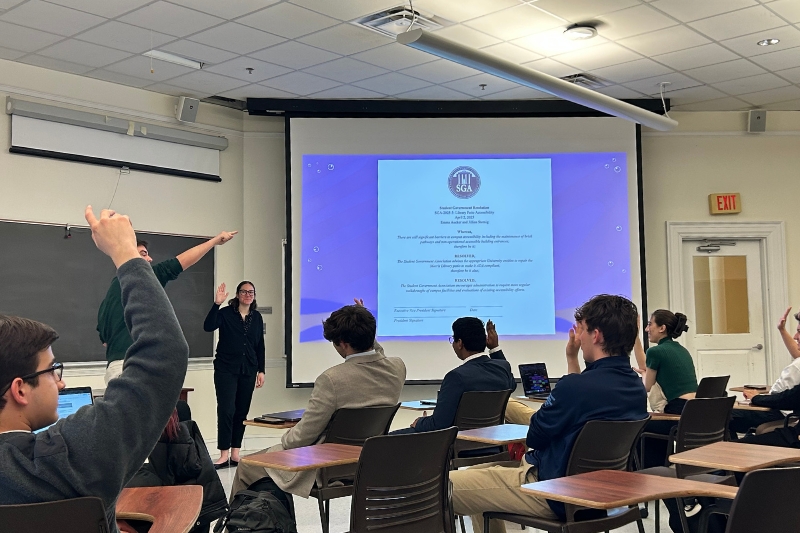


Economics meets the environment
Photos by Jeremy Wayman and courtesy of Emma Aucker July 07, 2025
Environmental and resource economics major Emma Aucker blends her passion for the environment with applied economics expertise
After taking Advanced Placement (AP) environmental science in high school — and loving it — Emma Aucker, now a senior environmental and resource economics (ENRE) major at the University of Delaware, knew she wanted to go into a career related to the environment. But she wanted to be a steward of the environment by shaping policy rather than through fieldwork.
“When I was a senior in high school, I really had no idea of what I wanted to do, but my family suggested that I might like the empirical side of economics, so I started applying to environmental science and economics programs,” Aucker said. “I eventually came across UD’s environmental and resource economics program, something I didn’t really see anywhere else.”
Now, after being at UD for three years, the program has allowed her to blend her passion for the environment with policy by using the decision-making tools of economics.
“I love the environment, but I don’t love being out in the field,” Aucker said. “That’s why this major was perfect for me. It allows me to protect what I love through policy and research, which I really appreciate.”
Her first economics course at UD was Economics of Agriculture and Natural Resources (APEC150), an introductory course for ENRE majors. Though Aucker didn’t have any prior economics knowledge, the course reinforced her decision to stick with the major.

Aucker’s enthusiasm and grasp of the material earned her a teaching assistant (TA) position for the course with Christina McGranaghan, assistant professor in the Department of Applied Economics and Statistics (APEC).
“I asked her to become a teaching assistant for me because I felt that she was passionate about the topic and she clearly had a really strong understanding of the material,” McGranaghan said. “She is great at communicating and engaging with others, so she seemed like a great fit for the role.”
Aucker completed her third semester as a TA for APEC150, and she has no intention of stopping.
“When I took [APEC150], it was the first class that made me feel like, ‘Okay, this is what my major is supposed to be about,’”Aucker said. “I am very passionate about this subject, especially when students come in, one-on-one, for my office hours. I really enjoy getting the chance to help them work through things and maybe make them as excited about it as I am.”
Beyond academics, Aucker helps foster community within the UD College of Agriculture and Natural Resources (CANR). With the help of McGranaghan, Aucker created a Canvas page with dedicated resources for the two CANR majors — environmental and resource economics and food and agribusiness marketing and management.
“The Canvas page brings the opportunities to the students, but also brings our students closer together,” Aucker said. “I hope to have LinkedIn workshops, professors come talk about their research, an APEC alumni panel or fun social events.”
This initiative also laid the groundwork for the formation of the Applied Economics Student Association, where Aucker serves as secretary, working to enhance professional development and networking for students.
She is also an active member of the Women in Economics Club, Horticulture Club and the Student Government Association (SGA), where she serves as Sustainability Senator.
“One of the things I enjoy most about my major is that even though I want to specifically focus on the environment for my career, I still get the interdisciplinary nature of economics,” Aucker said. “I take classes in [the Alfred Lerner College of Business and Economics] and CANR, but I’ve also had geology classes in Earth, Ocean and Environment, and music classes in Arts and Sciences. My major gives me the freedom to meet a ton of new people all the time.”
In SGA, she works to identify gaps in the University’s sustainability and accessibility initiatives to develop policy proposals to address them.
“I’ve been working with the previous sustainability senator to go through what the Office of Sustainability is like, what their action plan is now and what they want to accomplish,” Aucker said. “I am mainly trying to look for any gaps I saw that can be addressed by SGA initiatives.”
Aucker’s work with the SGA and Applied Economics Student Association is enhanced by her time as a Community Engagement Scholar, which reinforced her interest in community-based work.

This past spring break, she participated in a UD Alternative Breaks (UDaB), volunteering in Washington, D.C., at Bread for the City, learning about food banks and food aid.
“I’ve participated in service before, but the program I was on was incredibly immersive and our community partners, Bread for the City, were also wonderful,” Aucker said. “I learned a lot about food banks and food aid which made me even more excited to hopefully participate in research this summer.”
While Aucker remains open to various different career fields, environmental stewardship and community service remain at the core of her motivations.
“I think it would be cool to work for the Environmental Protection Agency (EPA) or some other government environmental organization,” Aucker said. “But I’ve also always enjoyed community work, so I could see myself at an environmental nonprofit as well. If I don’t go into something research based, that would be what I’m most interested in.”
According to McGranaghan, students who come out of UD with an ENRE degree can take various post-graduate paths, including careers in public policy, sustainability, education and research — for example, by pursuing graduate programs and research fellowships in non-governmental organizations.
“Our majors prepare students for a wide range of environment-related careers,” McGranaghan said. “I also see many students go into environmental consulting, where they consult for state or federal governments or non-governmental organizations. For example, our students might help to quantify the benefits of ecosystem service projects in economic terms.”
Right now, Aucker is interested in pursuing issues surrounding the U.S. food system and sustainability.
“I am particularly interested in food issues, like the food system, how food distribution works and food access issues,” Aucker said. We’re failing at the last one a lot of the time, and I’m interested in learning what policy can do to remedy that.”
McGranaghan emphasized that students, like Aucker, with this dual passion for the environment and economics have no shortage of opportunities. Especially as they tend to be passionate about environmental issues and analyzing these problems through an economic lens.
“Our students want to better understand human decision making and behavior and how that impacts the environment,” McGranaghan said.“A better understanding of these human dimensions can help shape policies that effectively protect the environment, or that encourage people to act in more environmentally friendly ways.”

Contact Us
Have a UDaily story idea?
Contact us at ocm@udel.edu
Members of the press
Contact us at mediarelations@udel.edu or visit the Media Relations website

